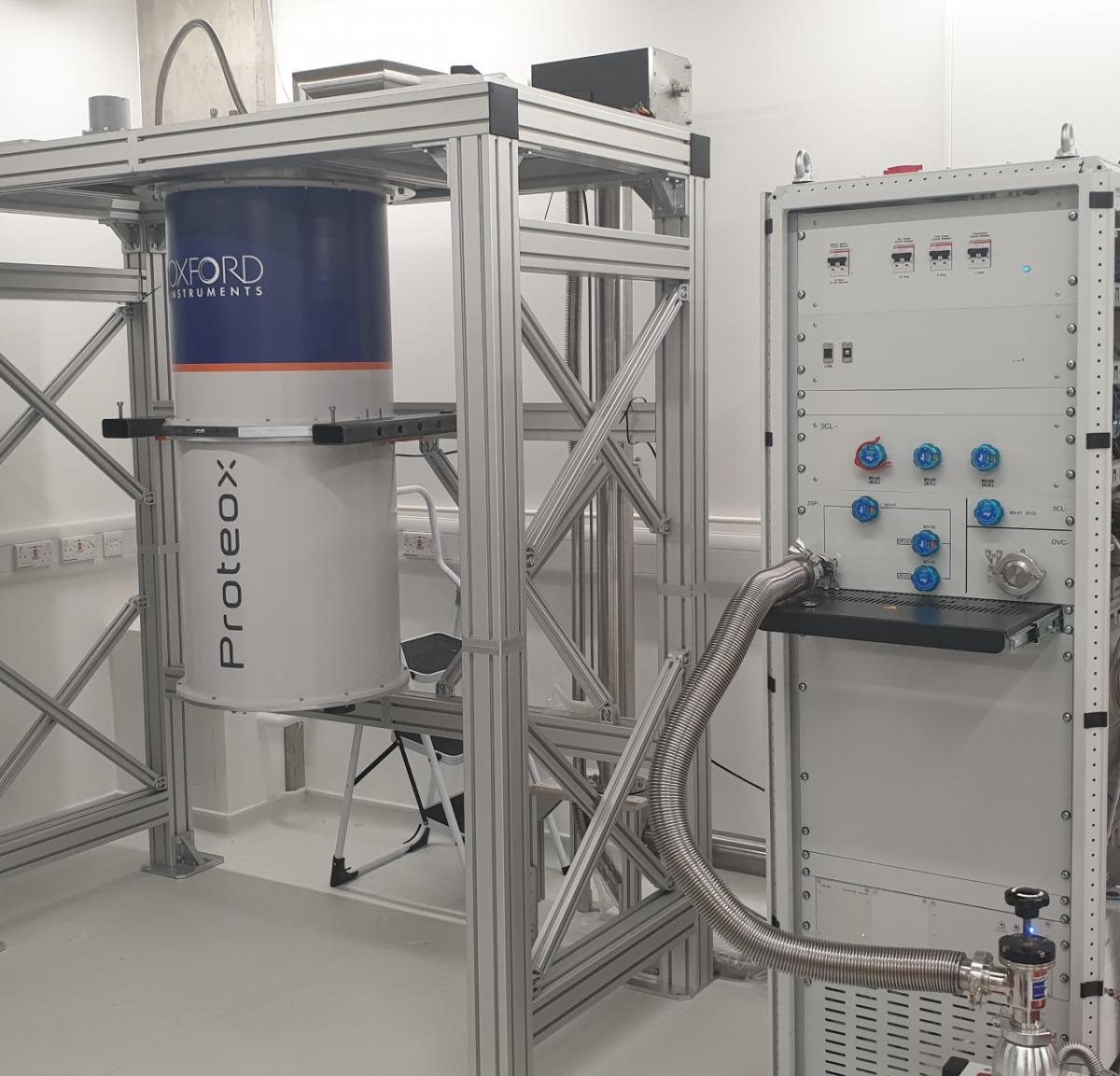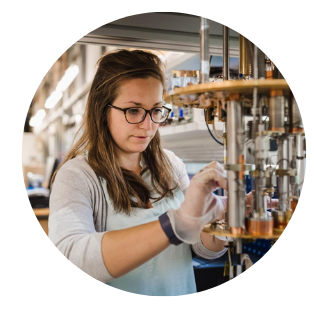Applications
 Part of the Oxford Instruments Group
Part of the Oxford Instruments Group
Expand
Collapse
It’s been a busy start to the year with a number of installations of our next generation dilution refrigerator, Proteox. As part of our engagement and collaboration with customers, we were keen to ask a series of questions, to find out more about how they view quantum and how they are looking to use, for example, Proteox. For our first customer Q&A, I am joined by Connor Shelly and Brian Vlastakis, Senior Quantum Engineers at Oxford Quantum Circuits (OQC).
Sure. At Oxford Quantum Circuits, we build quantum computers. We focus on Quantum Computing as a Service - QCaaS - to help our customers trailblaze new commercial and scientific approaches.
Whilst it is currently impossible to predict the exact ramifications and impact that quantum computation will have, we know that quantum computers will provide radical solutions to incredibly complex challenges such as drug discovery, supply-chain logistics, next-generation battery technology and financial portfolio optimisations. Our aim is to make sure OQC provides the quantum computers to fuel this step change worldwide.
But we recognise - first hand - that building useful, commercial-grade quantum computers is still an incredibly hard feat. We need world-class, diverse people and innovative technology to make it happen. We’re using superconducting quantum hardware spun out of the University of Oxford. Our core innovation, the coaxmon, solves many of the current limitations to quantum hardware and will enable OQC to power a quantum-enabled future.
Qubits are the building-blocks of a quantum computer. Each qubit requires individual access for control and readout. Superconducting circuits - the approach we’ve chosen to build our quantum processor - are highly engineerable compared with other options and give us the power to design our systems with a high degree of customisation.
But typical superconducting qubit technologies only allow scaling in 1-dimension, ‘in-plane’. This makes wiring-up large arrays of qubits difficult. Any fixes to allow scaling in 2-dimensions require increasingly intricate engineering to route control wiring across the chip to the qubits, degrading their performance.
OQC’s innovation - the coaxmon - solves these issues. Our quantum processor is built around a unique 3D architecture, which allows fewer fabrication steps and produces lower unwanted cross-talk than typical superconducting circuit technologies. It also makes the unit-cell readily scalable to large qubit arrays while maintaining the high level of quality and control required for useful quantum computation.

Oxford Instruments NanoScience has a long history of providing state-of-the-art low-temperature environments for academic research and commercial applications of low-temperature physics. Part of OQC’s ethos is to “partner with the best.” In this case a partnership with Oxford Instruments (OI) gives us access to a platform that allows us to reach < 10 mK, lower than the 20 mK temperatures required to operate our quantum computer.
Our collaboration started a few years ago, with our quantum processor originally being developed on OI’s previous Triton platform. With our move to Proteox a few weeks ago we have been able to work closely with the team at OI NanoScience to produce wiring solutions that meet our specific requirements.
OI’s Proteox will be used as the low temperature platform on which our quantum processor development and quantum computer operation will be performed.
As mentioned, a key issue with all superconducting quantum computer implementations is the scalability to large numbers of qubits. Whilst OQC’s coaxmon provides inherent scaling on-chip, we still require a large number of control and readout lines to the qubits which means a large number of lines on the refrigerator. The Proteox provides a high-density wiring solution which allows us to scale up the number of qubits in our quantum computer.
The main benefit comes from the modularity provided by the secondary insert. It allows different experimental and characterisation set-ups to be created and inserted or removed from the fridge depending on the requirements of the customers. Also important is the “push-button” operation and ease of use of the Proteox as it allows our quantum engineers to concentrate on the cutting-edge quantum computers, rather than spending time getting things cold.
A few industries are already testing quantum technologies: pharmaceutical companies, agriculture (logistics, fertiliser), the financial sector, and businesses involved with big data - in this case using quantum computing algorithms to process data more efficiently.
Our customers will benefit from OQC’s enhanced ability to scale the coaxmon, and from the ease of use and flexibility of the Proteox refrigerator.

For instance the platform allows us to easily and quickly modify our quantum processor set up for bespoke applications as well as accommodating multiple
Measurement as a Service (MaaS) customer requirements. Some of the projects we look forward to immediately implementing on the new system include adaptive schemes for quantum chemistry simulation of complex molecules. Quantum computers are particularly good at predicting chemical reactions which could lead to breakthroughs in materials and energy research.
The UK is well-placed to generate some of the breakthroughs which are still needed to fulfill the potential of quantum computing. There is a high density of world-class research groups in the country, as well as high-quality nanofabrication facilities. With the recent launch of the National Quantum Computing Centre (NQCC) and additional political support, now is really the time to stay ahead of the game. And we’re proud to help in that regard: two of the recent projects OQC received awards for as part of the ISCF innovate UK also aim at positioning the UK as a global leader in the field. These could underpin major social and economic developments across the country.
It is likely that significant uptake beyond discovery or testing will come from early adopters in the financial sector, pharmaceutical industry, material sciences, AI, and security applications (cryptography, defense, etc). At this stage of quantum computing, those early adopters still have to adapt their problems to the limitations and configuration of the hardware available. Co-development between hardware companies and customers will lead to a large number of custom quantum computing platforms purpose-built for particular - and hopefully practical - applications. Ultimately, as quantum processors are scaled up, the use of quantum computing will permeate into every domain in which a quantum advantage can be realised.
A few things! We’ve recently opened our own state-of-the-art laboratory. This was a critical milestone for OQC towards the commercialisation of our tech. It was obviously a great moment for us and the team as well given how much work had got into specs and fit out, and our ambition to make OQC a go-to for expertise and consulting on Quantum Computing as a Service and Measurements as a Service. In the next few months we will prioritise our own R&D and partners projects, and we’ll be sharing further updates on what we’re doing with Oxford Instruments. In the meantime, we’re busy recruiting as the plan is to double in size in the next few months. We have over 10 roles open so it’s time to join!
Further readings:

Oxford Quantum Circuits has built the UK’s most advanced superconducting quantum computer, the only one commercially available in the country. With our unique 3D architecture, the Coaxmon, we bring key componentry and wiring off-chip, for unrivalled scalability.
OQC’s ambition is to lead the industry on Quantum Computing as a Service, enabling our customers to make breakthroughs discoveries, solving some of the world’s most challenging problems.


Brian Vlastakis

Harriet van der Vliet
Interviewer